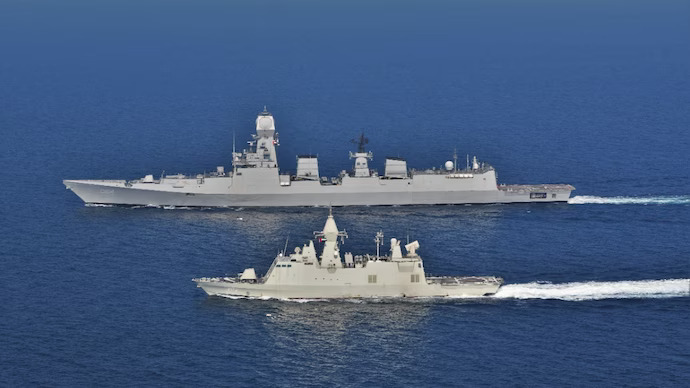Navies of India and the UAE carry out a military exercise
Context :
As part of initiatives to strengthen maritime security cooperation, the Navies of India and the UAE conducted a military drill.
Overview of the naval exercise
- Navy Exercise Zayed Talwar was performed by India and the UAE.
- The drill’s goal was to improve the two navies’ ability to operate together.
Dates and Places:
- The exercise was held from August 8 to August 11 off the coast of the United Arab Emirates.
Participating Naval Ships:
- Indian naval ships that took part in the exercise included the INS Trikand and the INS Visakhapatnam.
- One of the Indian Navy’s largest operating destroyers is the INS Visakhapatnam.
- A sophisticated stealth frigate named INS Trikand was launched in 2013.
Drill accomplishments:
- The drill sought to enhance communication and cooperation between the UAE and Indian fleets.
- The focus was on collaborative responses to shared problems like piracy, illegal immigration, human trafficking, marine security, and disaster relief efforts.
Growing Military Cooperation:
- The Middle East and India’s expanding defence ties reflect a strengthening of their economic and geopolitical ties.
- In the past, India’s relationships with the Middle East have been primarily about oil and expatriates, but today, defence cooperation is a crucial factor in the development of tighter ties.
Middle East significance for India:
- Due to issues including energy security, economic routes, geopolitical influence, and marine interests, the Middle East is extremely important to India’s defence and geopolitical policy.
Shared Interests:
- The Middle Eastern nations and India both see each other’s territories as significant components of their immediate surroundings.
- Their national interests are aligned with increased trust, collaboration, and partnership in the defence sector.
Geographical and economic factors:
- The Middle East is crucial to India’s defence and geopolitical strategy because of its position in trade routes, oil security, geopolitical influence, and naval force projection.
advantages of naval exercises
- Joint naval drills improve ties between the fleets, maritime security, regional stability, and interoperability.
- They also convey diplomatic messages of alliance and collaboration.
India’s economic growth’s effects:
- West Asian nations are drawn to India because of its expanding economic might, which promotes closer involvement and collaboration in defence and security issue





